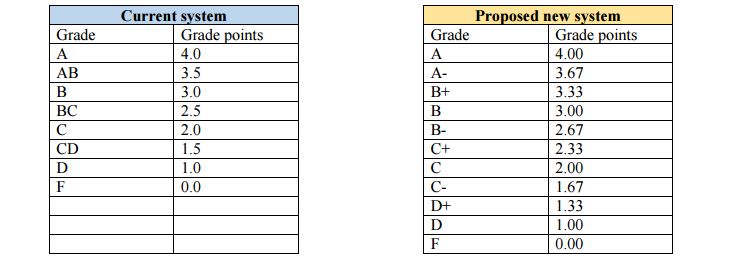I have never understood Marquette’s grading system. Prior to coming to the university, I had never heard of the “A to AB” scale. The concept was confusing to me, and although I adjusted over time, I still questioned why this scale existed in the first place.
The double letter scale had been Marquette’s standard scale for quite a while. When the announcement came that Marquette would be switching to a standardized system, graduating seniors seemed irritated, not because it wasn’t a necessary change, but because it took so long for the university to do it.
The whole situation is a head-scratcher. The proposal for the change was allegedly backed by all academic deans. Additionally, the law school had already used the “plus/minus,” or standardized, scale for their grades. That said, I don’t really understand why this change took so long to implement.
When the announcement came, I felt conflicted. On one hand, I’m glad Marquette is finally going to the standardized system. On the other hand, I’ve gotten so used to the old system that perhaps the adjustment to a standardized system may not be all good and may hurt students used to the previous grading scale.
The original Marquette scale could simultaneously help you and hurt you. Between each grade, students would either gain or lose half of a grade point. That means if they barely got an AB after almost getting a B, they would gain a sizable amount of grade points. However, if a student barely missed an A, then they lost that same amount.
I learned that the hard way in my Biology class last year. I just barely missed an AB after I didn’t do well on the final exam. I received a B, and my GPA took a hit, which is irritating because with the new, standardized grading scale I would have received a B+.
In a way, I appreciated this system. It got me to work harder for a grade because I didn’t want to get stuck with a loss of half a grade point by barely missing an A. This happened to me on multiple occasions, when I escaped receiving a B and got an AB instead. That’s a whopping half point higher than what I could have gotten. However, this does not mean this system is effective or accurate.
For me, getting anything below a 3.0 is unacceptable. It is ridiculous that there is only one grade separating an A from a B, whereas there are two more accurate grades on a standardized scale. The lack of in-between grades are one of the ultimate short comings of this “double letter” scale.
With this system, there is no way to discriminate between someone who barely made the cut for an AB and someone who barely missed getting an A. Since transcripts do not display percentages, you could be lumped in with someone who you got as many as six percentage points more than, which could hurt your academic record in the eyes of potential graduate schools and future employers.
That means that this scale is not exactly an accurate representation of an individual’s performance in a class. There should be some grade in between an A and an AB to more accurately measure how you performed in a class. The new grading scale does just that, adding the A- and B+ grades, which have 3.67 and 3.33 grade points, respectively.
Plus, using a standardized scale is more beneficial when graduate schools look at a student’s transcript. Graduate schools will likely lump in your GPA with other people from other schools who use the normal grading scale. Therefore, using Marquette’s scale could put students at a disadvantage during the application process.
Since GPA is incredibly important for admission to a graduate school and landing a post-graduate job, it’s great that Marquette is finally acknowledging the fact that its non-standardized grading scale disadvantages those attempting to go to graduate school. I applaud this change by Marquette.






